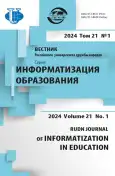Development of emotional intelligence among philology students in the practice of developing multimedia stories
- 作者: Nimatulaev M.M.1, Novoselova S.Y.2, Smerechinskaya N.M.2, Shiryaeva-Shiring O.V.3
-
隶属关系:
- Financial University under the Government of the Russian Federation
- RUDN University
- Southern Federal University
- 期: 卷 21, 编号 1 (2024)
- 页面: 21-34
- 栏目: EVOLUTION OF TEACHING AND LEARNING THROUGH TECHNOLOGY
- URL: https://journal-vniispk.ru/2312-8631/article/view/321373
- DOI: https://doi.org/10.22363/2312-8631-2024-21-1-21-34
- EDN: https://elibrary.ru/MYWGNU
- ID: 321373
如何引用文章
全文:
详细
Problem statement. The effectiveness of linguistic, interpersonal, and intercultural communication depends not only on professionalism, but also on the emotional abilities of its participants (communication skills, ability to react in unforeseen situations, determine the expectations and interests of others), and skills in using digital technologies. The study aimed at justifying the need to use multimedia stories in the training of specialists in the field of philology to develop their emotional intelligence. Methodology. Theoretical and methodological analysis and generalization of fundamental scientific works on the research problem, processing of test results, and the structure of multimedia stories are used. Experimental work was carried out on the basis of the Sochi Institute (Branch) of RUDN University. In the pedagogical experiment 54 bachelors were taking part, the direction of training is 45.03.01. Philology. Teaching philological disciplines. Multimedia storytelling was considered an innovative narrative practice based on the creation of emotional stories using digital technology. MS PowerPoint was used as a corresponding service. At the stage of diagnosing and assessing the formation of emotional intelligence, the N. Hall test was applied. The method of statistical processing was the Pearson χ2 test. Results. The use of multimedia stories in the training of specialists in the field of philology and humanities is carried out as follows: studying the digital service and its capabilities; concept development; collection and analysis of information; story creation and digital implementation; presentation and subsequent application in practice. With multimedia storytelling, philology students master the philosophy of dialogue between cultures, are aware of values (their own and others’), make moral choices, gain new social experiences, and design information and communication activities. Statistically significant differences in the qualitative changes that occurred in the pedagogical system were determined. Conclusion. The use of multimedia stories contributes to the development of the emotional intelligence of philology students due to the social nature of interpersonal and intercultural activities, multi-layered and non-linear circulation, multimodality, and support for an emotionally comfortable language atmosphere. The corresponding criteria for effectiveness are formulated: the presence of an idea (central element), the “mobility” of the main character, projection of the meaning of real life, structure, narrative style, etc.
作者简介
Magomedkhan Nimatulaev
Financial University under the Government of the Russian Federation
编辑信件的主要联系方式.
Email: mnimatulaev@fa.ru
ORCID iD: 0000-0003-4290-6073
Doctor of Pedagogical Sciences, Professor of the Department of Business Informatics
49 Leningradskii Prospekt, Moscow, 125993, Russian FederationSvetlana Novoselova
RUDN University
Email: novoselovaapk@mail.ru
ORCID iD: 0000-0002-2289-6878
Doctor of Pedagogical Sciences, Associate Professor, Professor of the Department of the Russian Language and Methods of Its Teaching, Sochi Institute (Branch)
32 Kuibysheva St, Sochi, 354340, Russian FederationNarine Smerechinskaya
RUDN University
Email: mss.narine@gmail.com
ORCID iD: 0000-0002-3467-3604
Candidate of Philology, Associate Professor, Head of the Department of the Russian Language and Methods of Its Teaching, Sochi Institute (Branch)
32 Kuibysheva St, Sochi, 354340, Russian FederationOksana Shiryaeva-Shiring
Southern Federal University
Email: shirayeva.oksana@gmail.com
ORCID iD: 0000-0002-7846-2702
Doctor of Philology, Professor of the Department of Russian as a Foreign Language and Teaching Methodology, International Institute of Interdisciplinary Education and Ibero-American Studies
105/42 Bolshaya Sadovaya St, Rostov-on-Don, 344006, Russian Federation参考
- Kallou S, Kalogiannakis M, Zacharis N, Kikilia A. Emotional intelligence development: the implementation of transformative learning through digital technologies in tourism - a study protocol. International Journal of Technology Enhanced Learning. 2023;15:180. http://doi.org/10.1504/IJTEL.2023.10054332
- Andrienko T, Chumak N, Genin V. Emotional intelligence and acquisition of English language oral communication skills. Advanced Education. 2020;7(15):66-73. http://doi.org/10.20535/2410-8286.201013
- Kolodina NI. Components of the concept and emotional state (based on the interdisciplinary study of everyday consciousness). Philological Sciences. Questions of Theory and Practice. 2020;13(8):228-233. (In Russ.) http://doi.org/10.30853/filnauki.2020.8.42
- Grinshkun VV, Bidaibekov E. How the education system should respond to the technological development and informatization of the society. Communications in Computer and Information Science. 2021;1024:26-33. http://doi.org/10.1007/978-3-030-78273-3_3
- Zalutskaya SYu, Nikonova NI. Professional training of future teachers of the Russian language and literature: advertising technology and students’ reading interests. Perspectives of Science and Education. 2020;(3):114-125. (In Russ.) http://doi.org/10.32744/pse.2020.3.9
- Soboleva EV, Vekua NN, Novoselova SYu, Yang G. Achieving personal educational results of secondary school students in the conditions of integrated informatization in teaching Chinese as a foreign language. Perspectives of Science and Education. 2022; (1):284-300. http://doi.org/10.32744/pse.2022.1.18
- Gopalakrishnan B, Vijayakumar S. Emotional intelligence and values in digital world through emoticons among indian students and faculty. International Journal of Asian Education. 2021;2:267-276. http://doi.org/10.46966/ijae.v2i2.142
- Khoutyz I. Storytelling in English and Russian-language lecture discourse. Moderna Språk. 2020;114(2):73-90. http://doi.org/10.58221/MOSP.V114I2.7399
- Sabari N, Hashim H. Sustaining education with digital storytelling in the English language teaching and learning: a systematic review. International Journal of Academic Research in Business and Social Sciences. 2023;13:214-231 http://doi.org/10.6007/IJARBSS/v13-i4/16860
- Sokolova TI. Language policy in the Russian Federation: main directions, problems and prospects. Social Space. 2021;7(5). (In Russ.) http://doi.org/10.15838/sa.2021.5.32.5
- Nassim S. Digital storytelling: an active learning tool for improving students’ language skills. Pupil. 2018;2:14-29. http://doi.org/10.20319/pijtel.2018.21.1429
- Ateş M. Using digital storytelling in language education: a systematic review study. Pamukkale University Journal of Education. 2022;59:340-364. http://doi.org/10.9779/pauefd.1101722
- Nair V, Yunus M. Using digital storytelling to improve pupils’ speaking skills in the age of COVID-19. Sustainability. 2022;14:9215. http://doi.org/10.3390/su14159215
- Berleva IN, Belyaev DA. Dialogue of screen and book cultures: film adaptations of literary texts. Context and Reflection: Philosophy of the World and Human Being. 2023;12(1-1):370-376. (In Russ.) http://doi.org/10.34670/AR.2023.40.57.034
- Akdoğan F. Enhancing English Vocabulary and reading skills through digital storytelling method. Innovational Research in ELT. 2023;4:60-72. http://doi.org/10.29329/irelt.2023.558.5
补充文件









